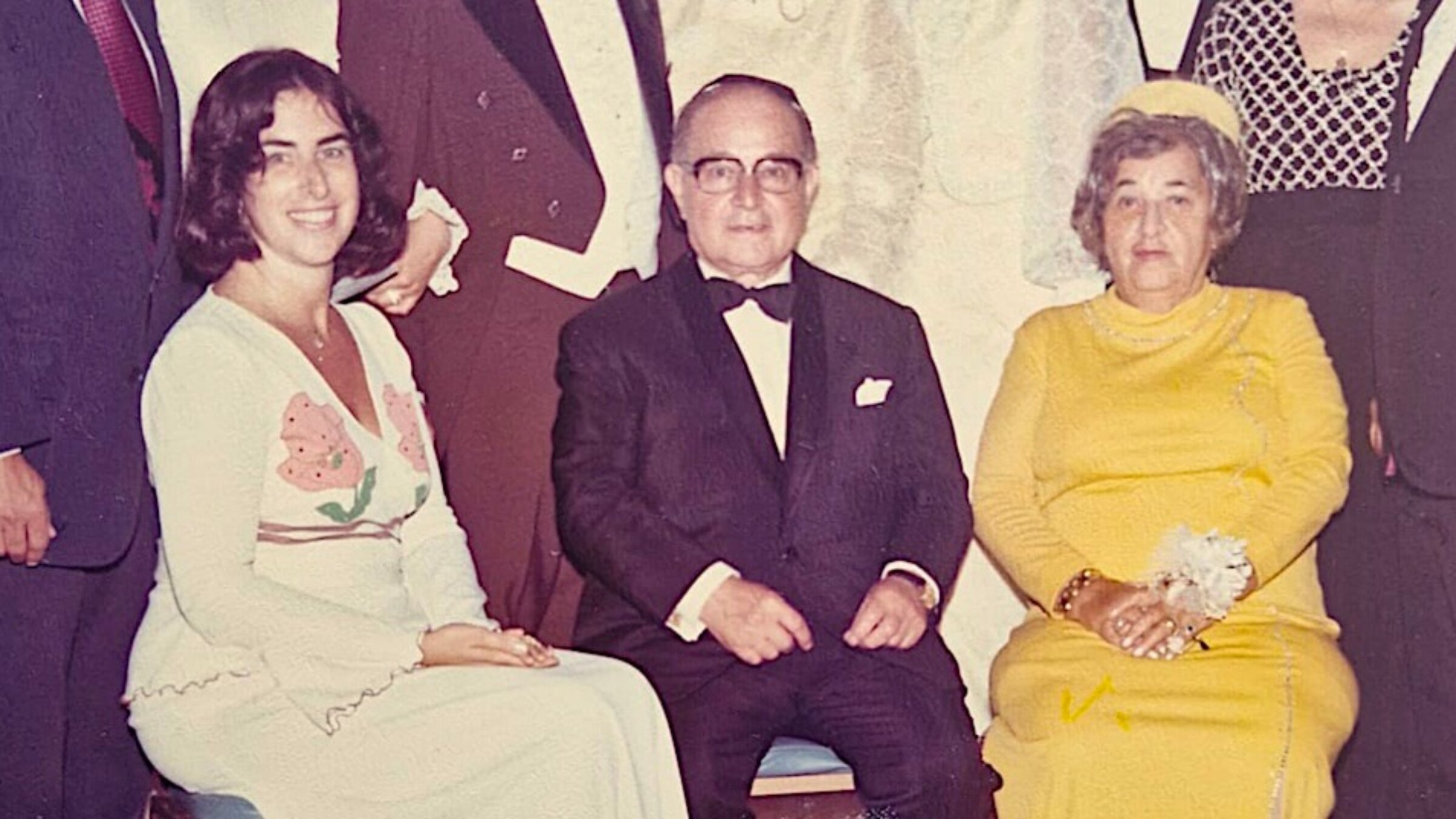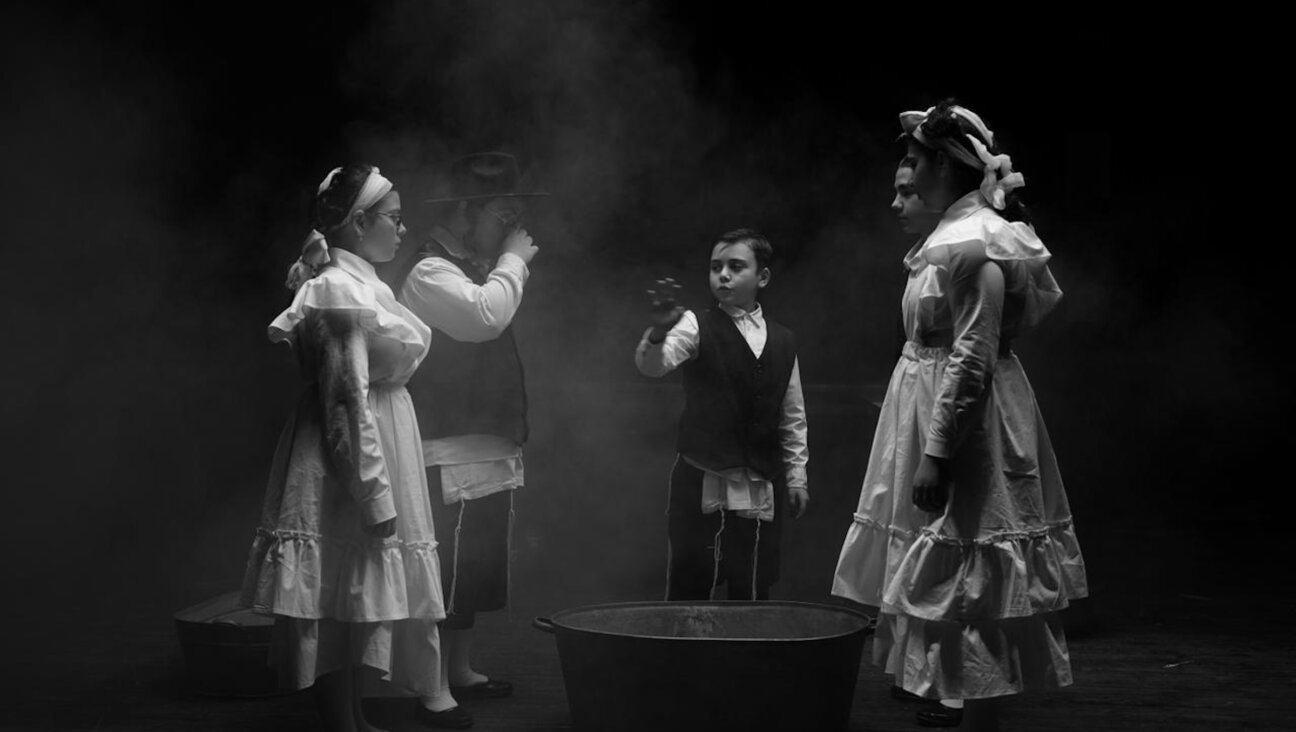The surprising thing I learned about my tough-as-nails Bubby
While interviewing her for an article I was writing, she mentioned a man she once loved — before she met my Zaidy

Bubby, in the yellow dress, at her grandson’s wedding, Aug. 24, 1975. Courtesy of the Weil- Weintraub Family
If you’ve ever had cooked spinach mixed with mashed potatoes, you know what my childhood tasted like.
It’s what Bubby Weintraub made every time I visited. She was my father’s mother, and her head was filled with so much Torah and Yiddish that cooking was way on her back burner.
She was a rebbetzin, a Rabbi’s wife, and I suspect the title might have been the happiest benefit of her marriage. When my grandfather, Rabbi Mordecai Weintraub, passed away when I was a teenager, Bubby assumed his mantle of learned Judaism.
That meant that the Rabbi in shul would stop his sermons right in front of the packed synagogue and ask, “Am I right, Rebbetzin Weintraub?”
If he were, she would nod. If he were not, she would correct him.
I sat next to her, in the first row of the tiny ladies section at our Young Israel of Hillcrest, in Queens, New York — a total fire trap with its one entrance — and slow teetering ladies in their Shabbos heels.
Bubby was seriously pious. She would hiss in Yiddish when she caught me staring at a certain boy through the mekhitze (partition separating men and women). She would tap the prayer book with her wrinkled finger, and her wrinkled chin went up and down as she prayed at warp speed.
After services she would exit the synagogue, pausing on the small plaza to receive the respectful wishes from all the “pipple,” as they passed, saying “Good Shabbos, Rebbetzin Weintraub,” “Good Shabbos, Rebbetzin Weintraub.”
I, in charge of schlepping her to our house for lunch, stood in utter fear of someone asking the one question that would delay our fressing on Mommy’s Shabbos soup with the marrow bones in it.
Unfortunately, one of those ‘pipple’ always asked.
“So, Rebbetzin Weintraub, how are you?”
It was her absolute favorite question. And her answer always started with the same word: “Oy.”
Oy. The bursitis, the phlebitis, the arthritis. Oy. No one understood what she went through. And — oy, her thyroid, her gallbladder, not to mention her sciatica.
Finally home and around the table, my father would sing his beautiful kiddush and Bubby would reach up and pull off her head.
The grey wig came up and up and off, and — PLOP! — she would drop it right on the dining room side table directly in my line of vision — like roadkill.
“Ahhhhh!” I screamed.
“Vat?” She would cackle, one of the few times I heard a happy sound out of her. “You don’t like my ‘vig’? It should really make you laugh!”
What really made us laugh was when we tried to get her to say “th.” As in “things.” She couldn’t say it. She would say “dinks.”
“No, Bubby,” we would say. “Thhhhings. Put your tongue between your front teeth.”
“Thhhhh,” she would start. We would lean in. “Thhhhhhhhhh — dinks!”
Years later in college, I became the editor-in-chief of the Jewish newspaper, and we did a big Holocaust commemoration issue.
I asked Bubby if I could write her story, which I thought I knew.
We sat in her dining room, and over spinach and mashed potatoes, she started to tell me about her girlhood in Lithuania.
Her parents made sure she would be educated, and in her late teens she moved to Antwerp, Belgium, and she and a friend started a Torah study group. A friend? Yes, a friend. Male? Yes. Sharfmanovitz.
I caught something new in her tone. Bubby?
I once heard a Rabbi ask her, “What did God really do on the seventh Day?” And I remember her actually smiling. “Mezaveg zevugim,” she answered. The Rabbi smiled, too. On the seventh day, God played Matchmaker. God was — Romantic.
Was Bubby romantic, too?
“Ve vanted to get married.”
Sharfmanovitz. She had been in love with Sharfmanovitz.
And all of a sudden, wrinkled, old Bubby was a young girl. Like me.
But then she found out that he had been betrothed as a baby to his father’s business partner who had just had a baby girl.
“He never told you?”
”I never knew.”
Betrothed. As a baby! Sharfmanovitz had never even met the girl.
But a neder is a neder. A vow is a vow.
Sharfmanovitz couldn’t get out of it. And so he left Antwerp, left Bubby. Left her to run the group alone.
And a year or so later, a new young man, an earnest and brilliant Torah scholar with round glasses, showed up to that little study group.
I like to think that God, The Romantic, had a back-up plan.
I still have their wedding picture. Neither of them was smiling.
And I still like spinach and mashed potatoes. One of my favorite “dinks.”
Recently, my mother said: “Mix a little shallot into the sauteed greens. It’s delicious.”
Like memory. Salty in my mouth.
















